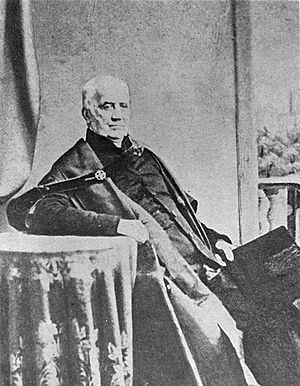Charles Thorp facts for kids
Quick facts for kids
Charles Thorp
|
|
|---|---|
 |
|
| Warden of the University of Durham | |
| In office 1832–1862 |
|
| Preceded by | New creation |
| Succeeded by | George Waddington |
| Master of University College, Durham | |
| In office 1832–1862 |
|
| Preceded by | New creation |
| Succeeded by | Joseph Waite |
| Archdeacon of Durham | |
| In office 1831–1862 |
|
| Preceded by | Richard Prosser |
| Succeeded by | Edward Prest |
| Personal details | |
| Born | 13 October 1783 Gateshead, County Durham, Great Britain |
| Died | 10 October 1862 (aged 78) Durham, County Durham, Great Britain |
| Alma mater | Peterhouse, Cambridge, University College, Oxford |
| Profession | Priest and academic |
Charles Thorp (born 13 October 1783 – died 10 October 1862) was an important English churchman. He was a rector (a type of priest) in the parish of Ryton. Later, he became the Archdeacon of Durham. He is best known for being the very first leader, or "warden," of the University of Durham.
Contents
Life of Charles Thorp
Charles Thorp was born in Gateshead, which is in County Durham. His father, Robert Thorp, was also a church leader. Charles went to the Royal Grammar School, Newcastle and Durham School.
His University Years
In 1799, Charles started studying at Peterhouse, Cambridge. He then moved to University College, Oxford. He earned his first degree in 1803 and a master's degree in 1806. In 1806, he became a Fellow and Tutor at University College, Oxford. He became a deacon (a step in becoming a priest) in 1806 and a full priest in 1807.
Work in the Church and at University
In 1811, Charles Thorp became the rector of Ryton. Many important people had held this role before him. After his time as rector, he became a Canon in 1829. Then, in 1831, he was made Archdeacon of Durham.
A year later, in 1832, he became the first Warden of the University of Durham. This was a very important job. He also became the first Master of University College, which is part of Durham University. Charles Thorp stayed involved with the university until he died in Durham in 1862. He was buried at Ryton Church.
Charles Thorp's Achievements
Charles Thorp did many amazing things during his life. He believed in helping people and making the world better.
Education for Everyone
Charles Thorp thought that everyone should have access to free education. He worked hard to introduce free schooling in Ryton. He believed education was important and could help people improve their lives.
Fighting Against Slavery
He was a strong supporter of ending slavery. He worked with the Church Missionary Society. Together, they helped set up a university in Freetown, Sierra Leone. This university made sure that freed slaves could get an education.
Caring for the Environment
Charles Thorp was an environmentalist long before it was a common idea. He planted many trees, like oak, sweet chestnut, and beech, in Ryton's churchyard. These trees are still growing strong today. He also helped protect wildlife. He arranged for his family to buy the Farne Islands. He then hired a special warden to protect the rare birds living there.
Helping People with Money
He was very creative in finding ways to help people who were struggling financially. He started the first "penny bank" in the country, right there in Ryton. This bank allowed people with small incomes to borrow money at fair rates they could afford.
Recognized for His Work
In May 1839, Charles Thorp was elected a Fellow of the Royal Society. This is a very high honor given to important scientists and thinkers.
His Legacy Today
In 2011, a secondary school in West Gateshead was named after him. It is now called Thorp Academy. This school is on the same site where Charles Thorp sponsored a school during his lifetime.
 | Stephanie Wilson |
 | Charles Bolden |
 | Ronald McNair |
 | Frederick D. Gregory |

